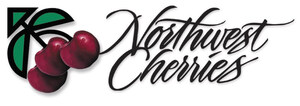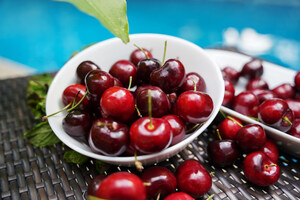YAKIMA, Wash., June 16, 2021 /PRNewswire/ -- Summer means a menu filled with fresh produce, but now is the season for the cherry on top. Cherry harvest is now in full swing in the Pacific Northwest, and a shorter crop should mean bigger and sweeter cherries for us all. Each summer, over 2,000 growers spread across Washington, Oregon, Idaho, Utah and Montana come together to produce what we all think of as the short season of summer cherries. As it turns out, there are more reasons than just their classic flavor to keep cherries in the fridge during the summer; continuing research shows sweet cherries pack a serious health punch as well.
"For so many of us, a bowl of cherries around the pool or in the backyard was just a part of summer," said James Michael with the Northwest Cherry Growers. "The pandemic brought about a lot of rediscoveries in the simple pleasures at home, like homemade sourdough or a bowl of ice-cold, fresh cherries." Since they have such a short season, the Northwest Cherry Growers works to communicate with consumers each year, letting shoppers know when they can get their hands on the best cherries.
Northwest-grown sweet cherries are one of the last true seasonal fruits, and are only available for a brief window each year stretching between June and August. Harvest begins along the warm banks of the Columbia River and progresses, orchard by small orchard, further north and eventually up the lower slopes of the Cascade mountains. Each cherry is picked by hand, and then whisked off to a state-of-the-art facility where they're chilled, sorted, inspected and shipped to shelves worldwide. Most of the time, that whole process happens within 24 hours, so there's no better time than the present to stock up on the fresh selection whether shopping in-store or online.
"Fresh cherries are such an easy way to take a cheese board or a pitcher of spritzers up a notch, and they make a great quick pickle," said Michael. While all cherries from the Northwest are known for their size and sugar, some varieties stand out. Rainiers – the yellow cherries with a pink blush – have an even shorter season, typically winding down by mid-July. "They're the sweetest of all of the varieties and make a nice flavor contrast when mixed in with the classic red varieties," said Pat Sullivan, a cherry grower in southeastern Washington.
Due to the optimal growing conditions in the region which allow for an extended hang time on the tree – where the fruit accumulates sugar – Northwest-grown sweet cherries typically boast the highest fruit sugar content of any cherries. That makes them not only a great snack straight from the bowl, but offers a seasonal twist to recipes that call for a hit of sweetness with a brace of acidity. And with one of the lowest glycemic index scores of all fruits, they're a treat for everyone in the family, including those watching their blood sugar.
This summer, the Northwest cherry growers anticipate harvesting 22.4 million boxes of cherries, which is down from most years but still a 13% increase from last season's 19.8 million-box crop, ensuring shoppers coast-to-coast can enjoy sweet cherries this summer and beyond. Those looking to stretch those cherry additions to a menu a bit longer, Michael says fresh cherries can become a great freezer staple. "They make a great dried fruit, but I think freezing is the easiest. I pit some to use in recipes later, especially around the holidays, and leave the rest whole to eat straight from the freezer as a quick snack."
Whether they're baked into a pie, added to a cheese board, preserved for later or enjoyed as a fresh snack, sweet cherries are the perfect pick to make this summer the sweetest one yet. For more information on delicious, dark-sweet Northwest cherries—including recipes, canning ideas, health tips and more—follow the Northwest Cherry Growers on Facebook, Instagram, Pinterest and Twitter, or visit nwcherries.com.
About Northwest Cherry Growers
Founded in 1947, the Northwest Cherry Growers is a grower's organization funded solely by self-imposed fruit assessments used to increase awareness and consumption of regionally-grown stone fruits. The organization is dedicated to the promotion, education, market development, and research of cherries from Washington, Oregon, Idaho, Utah and Montana orchards.
SOURCE Northwest Cherry Growers

Related Links
WANT YOUR COMPANY'S NEWS FEATURED ON PRNEWSWIRE.COM?
Newsrooms &
Influencers
Digital Media
Outlets
Journalists
Opted In





Share this article